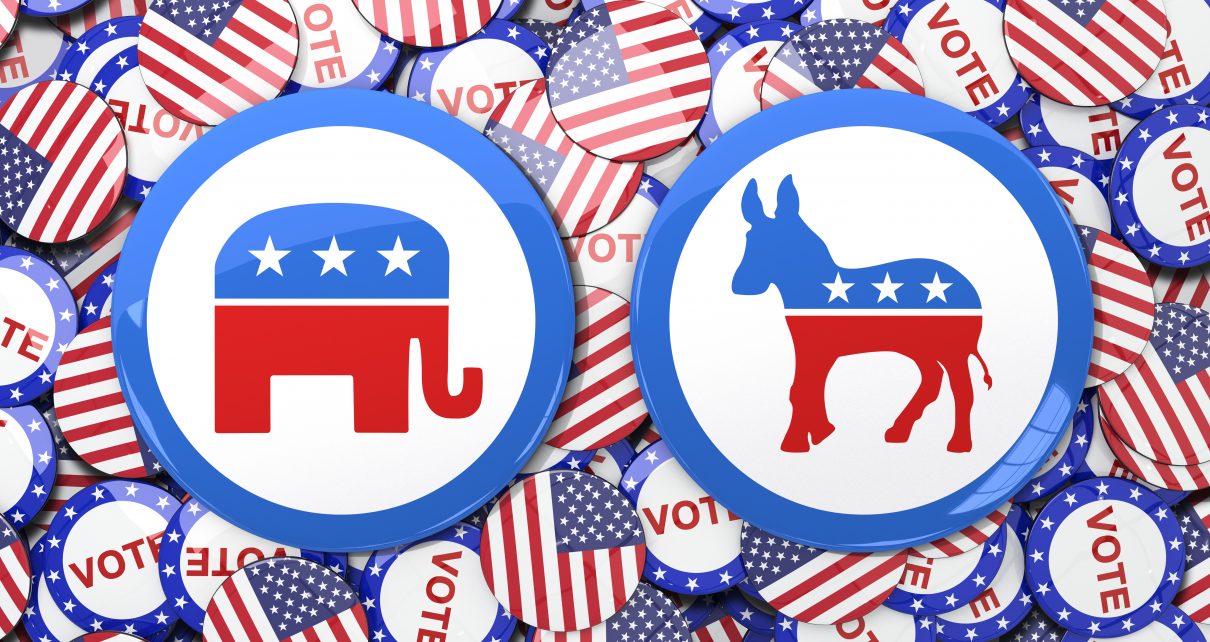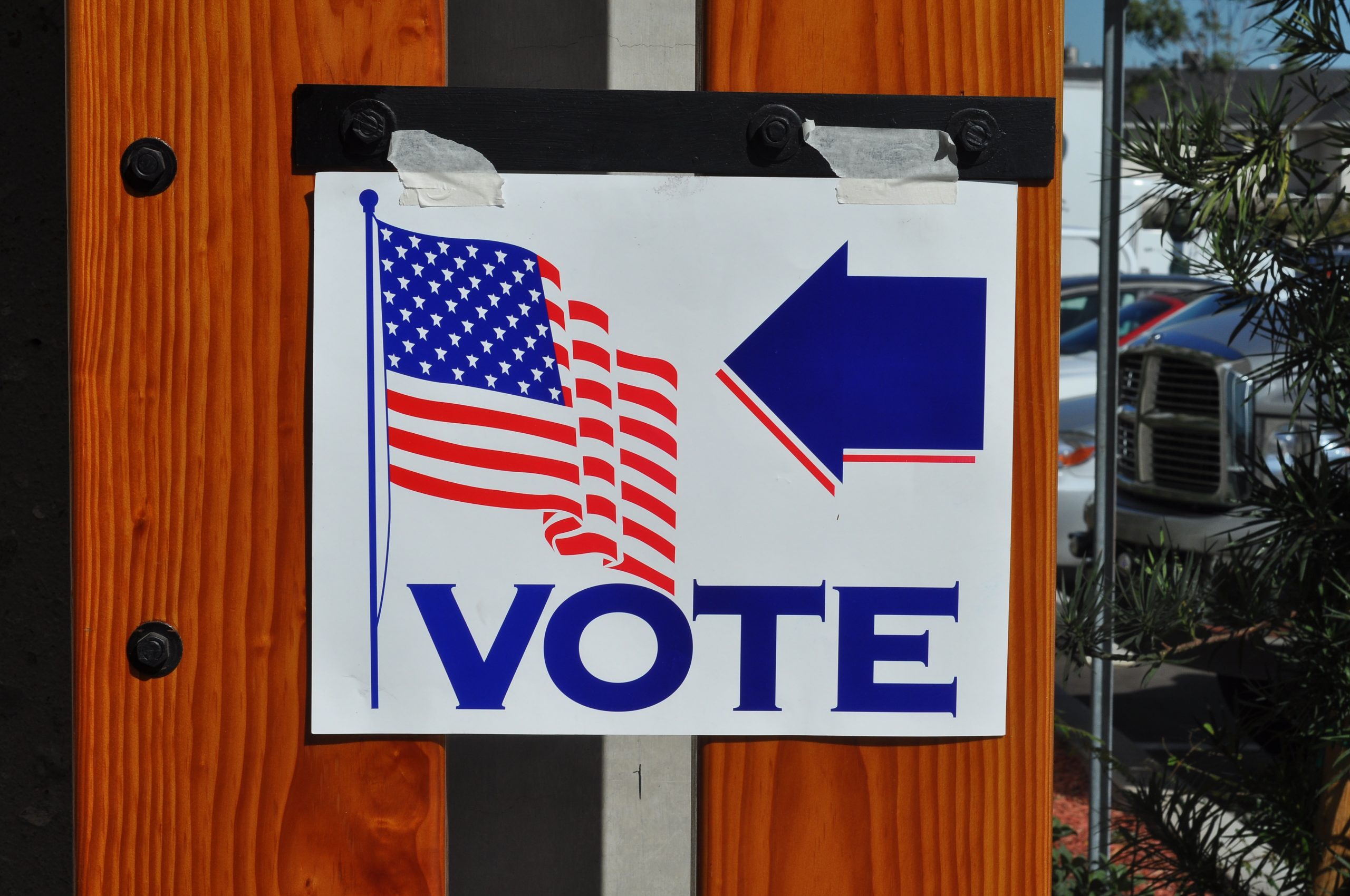
Democrat and Republican vote buttons. (Image: vectorfusionart/Shutterstock)
Opinion: Caucus Facts Versus Primary Posturing
The caucus is the purest and most traditional form of democracy, reminiscent of a time when voters understood that the right and responsibility to cast an educated vote
By Jim DeGraffenreid, September 4, 2023 1:35 pm
Ever since the Nevada Republican Party announced that we’d continue to select our Presidential nominee by caucus in 2024–as we’ve been doing for decades–there has been a surprising number of articles by so-called “conservative” commentators using liberal talking points in support of abdicating Nevada Republican’s right to choose their nominee to the state. Do any of these arguments hold water? Let’s take a closer look.
Caucus and Primary turnout are very comparable
A common talking point for critics is that the primary election is certain to have a much larger turnout than the caucus, but that doesn’t square with the facts. 75,482 Republicans participated in the GOP First in the West Presidential Caucus in 2016, or 17.8% of all registered active Republican voters. That was very close to the 18.5% turnout the state got later that year in their primary election, which had many races and questions on the ballot to draw voters, including a high profile U.S. Senate race.
It’s argued that universal mail in ballots and early voting will massively increase turnout, but that hasn’t been the case in Nevada. Making the false argument that universal mail in ballots would increase turnout, legislative Democrats unilaterally made them permanent in Nevada in 2021, yet turnout actually dropped significantly from 62.4% in the 2020 midterm election to 54.7% in 2022.
That was the expected result, as we testified when Democrats were passing their law. Turnout for the 2020 general election, when universal mail ballots were first put into law by Democrats falsely claiming they were needed for public safety, was 77.2%, almost the same as the Presidential election in 2016 where turnout was 76.7%. Both years were well below 2012 turnout which was over 80%.
It is clear that universal mail in ballots have not increased voter participation in Nevada, so there’s no reason to believe that the state run primary will have vastly more Republican voters participating than the caucus.
The Caucus allows drop and go voting, just like the primary
Some have suggested that the caucus is a time consuming and complex process that excludes ordinary Republican voters. But, just like the primary, the caucus is open to every Republican voter in the state. The Republican caucus has a drop and go feature which allows any voter who knows which candidate they wish to vote for to simply sign in, show their ID to prove identity, and then cast their ballot and leave without participating in any of the other caucus activities or conversation. This makes voting at the caucus the equivalent of voting in the state run primary for those who choose to participate in this way. The only difference is that we use paper ballots, which are only given to voters who ask for one, verify ID, and count the ballots in a transparent way so that we know who voted and so that everyone knows the results are accurate and secure.
For Republicans who choose to participate in the full caucus, they have the opportunity to discuss the candidates with their neighbors before the votes are cast. They can also suggest items for the party platform, and sign up to be delegates to the county and state conventions. It is the purest and most traditional form of democracy, reminiscent of a time when voters understood that the right and responsibility to cast an educated vote was worth an hour or two of their time every couple of years.
State law specifically allows for the caucus
Although Democrats asked the state to take over their nominating process, there’s no requirement in state law that parties use the Presidential Preference Primary to allocate and bind their delegates to the National Convention, where the party’s nominee is ultimately selected. Nevada officials are very clear that it’s the right of the parties to determine their nominee:
“The results of any PPP election are not binding on a major political party… Throughout the entire PPP election process, no major political party is required to do anything or be bound by any results.” (NVGOP v. Aguilar, Opposition to Motion for Preliminary Injunction)
The Caucus is not paid for with election funds
Some suggest that the party will be spending funds on the caucus that are better used to elect legislative Republicans. In fact, the party will specifically spend donor money on taking back legislative seats, as well as fighting Question 3, not on the caucus. The caucus expenses are covered by candidate filing fees, which are comparable to the fees charged by other caucus states, and are a fraction of what candidates would have to spend on massive media buys for a primary, allowing more candidates to participate.
That’s a big improvement over the millions of taxpayer dollars that the state plans to waste on a meaningless and confusing primary, but only true fiscal conservatives would care about that. Instead, in true big government fashion, caucus critics praise the fact that the primary will be paid for by the public.
The Caucus does not benefit any single candidate
It has been said that the caucus is being held so that it can be “rigged” to benefit President Trump. The fact is that primary elections are far easier to “rig” than a caucus. Generally, they’re “rigged” by spending millions of dollars on dishonest and misleading campaign ads, and whoever has the most money wins. Ballots are counted out of sight for days after the election, mail in signatures are sporadically checked, and there’s no way to audit the results.
Caucuses, on the other hand, take place in thousands of individual precinct meetings around the state. The paper ballots are counted publicly in front of everyone at the meeting who wants to watch, and the results are posted publicly by the next day for all to see. It’s the very definition of a process that cannot be rigged.
Winning a caucus comes down to grassroots organizing and talking to voters, creating a level playing field. Caucus success goes to the candidates who take the time to visit all the counties in a state and build grassroots support. Candidates like Ron DeSantis understand that, as proven by their campaign’s public statements on how they plan to win the Iowa caucuses:
Based on current polling, as well as the fact that his fundraising and cash on hand is greater than the other candidates, Trump would likely perform better in a primary than a caucus, where his opponents have the same opportunity that he does to build grassroots support on a level playing field, and where all candidates can compete, not just the wealthy ones.
The Bottom Line:
The First in the West caucus is open to every registered Republican voter in the state of Nevada. While we’re disappointed that the state is going to waste significant taxpayer dollars on a confusing and meaningless primary, we’ll select our nominee by our usual caucus process because it fulfills Republican’s desire to pick our nominee without outside interference in a secure and transparent process that gives all the decision making power to grassroots Republicans.
- Opinion: Caucus Facts Versus Primary Posturing - September 4, 2023





15 thoughts on “Opinion: Caucus Facts Versus Primary Posturing”